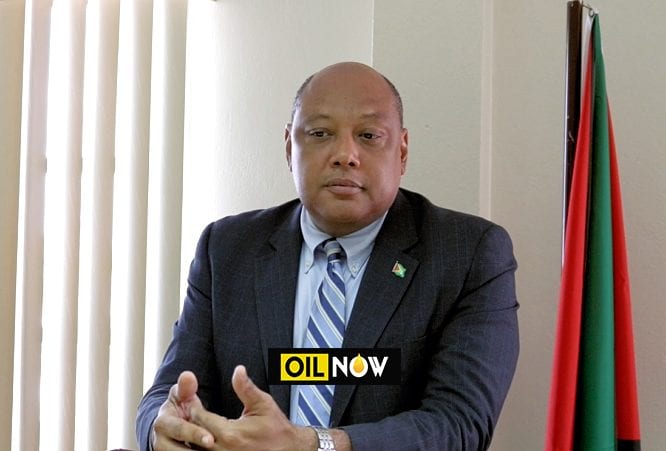What was considered a ‘signing bonus’ for the 2016 Stabroek Block Production Sharing Agreement (PSA) was in fact funds provided to Guyana in support of its efforts to address Venezuela’s claim to two-thirds of its territory.
Guyana’s former Minister of Natural Resources Raphael Trotman made the clarification in a tell-all book “From Destiny to Prosperity”, where he broke his silence to finally address issues of public concern surrounding the signing of the PSA and the events leading up to it.
A signature bonus is a one-time fee for the assignment and securing of a license, paid irrespective of economic success for the contractor or licensee. Not all states use bonuses, but the government may charge a minor fee for handling license applications.
The US$18 million was a hot topic back in 2017, and Trotman faced questions as the David Granger-led administration was constantly being criticised for their management of the new oil sector. News of Guyana receiving the sum was not immediately known. And when it was eventually leaked to the press, variations of the figure and its purpose surfaced. Trotman sought to clear the air.
It was the Presidential Decree No. 1.787 issued by Venezuela on May 25, 2015, that led to the new PSA and the US$18 million figure being received. The territory Venezuela claimed contained ExxonMobil’s stellar Liza 1 find. And thus, the then administration needed to find avenues to protect its patrimony.
US$18M signing bonus not cost recoverable – Trotman | OilNOW
“The coalition Government had to act fast, and act it did. A targeted diplomatic effort was mounted at the regional and international levels, and a discussion was had with ExxonMobil about solidifying the relationship and taking every step to secure and develop the resource, as quickly, as technologically possible. Going forward, it is safe to say that all engagements between Exxon and the Ministry of the Presidency, the Ministry of Foreign Affairs, and the Ministry of Natural Resources became inextricably linked,” Trotman wrote.
It was explained that at a 2015 meeting with high-ranking members of Guyana’s government and Exxon, a request was made for support (including monetary) with Venezuela.
According to Trotman, he was told by a “senior Exxon executive that Exxon does not hand over money to governments, and that a way had to be found to pass that money over through a legal means.”
So, the idea of a “signature bonus” was born.
“It was certainly not my invention, or by my initiation,” he wrote.
Trotman said after consulting Cabinet, he received the go-ahead, with instruction to “make sure everything was legitimate.”
“It was on this basis that we proceeded – not with an intention to renegotiate the terms of the 1999 agreement, but rather, to find a way to solidify a relationship with Exxon as a development partner, and at the same time, receive much needed financial and other support to advance our case against Venezuela’s spurious and patently false challenges and threats. The “signature bonus”, as it was called, was not the traditional bonus that other countries received for the development of their resources, and therefore did not attract the high numbers that they did,” he said.
Trotman revealed that the initial amount sought by Guyana was US$15 million – benchmarked against a similar sum raised by CGX Inc. and adjusted for inflation to assist with the retention of the legal team that handled Guyana’s case with Suriname before the International Tribunal for the Law of the Sea (ITLOS). The extra US$3 million was added to be used by the Guyana Geology and Mines Commission and other related agencies for capacity building.
“The sole objective, and need for this ‘bonus’, was for it to be put towards Guyana’s diplomatic and legal efforts at casting off, from its back, the dark shadow of Venezuela’s continuous and mounting threats,” he said.
Trotman also explained that since the sum was not the “traditional bonus” commonly received by countries, it did not “attract the high numbers” they did. But an assessment from the International Monetary Fund (IMF) still deemed it a “fair sum for a ‘frontier’ producer.”
The former Natural Resource Minister said the “bonus”, though frowned upon by “misguided persons”, was well applied as Guyana’s efforts in the case have been vindicated thus far.
“Guyana’s decision to solidify relations with ExxonMobil, Hess and CNOOC, and to press the United Nations to bring this matter of Venezuela’s claim and constant sabre rattling to an end, was a very costly and risky one, but in the end, the right one, and well worth it. Guyana will be vindicated, and the people will be able to live happily and peacefully,” the former oil minister said.



